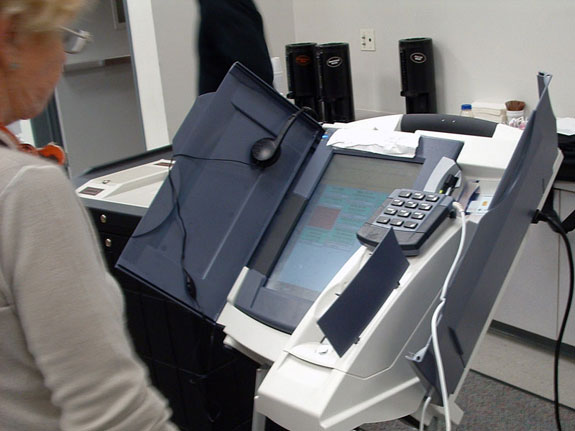
County election supervisors were asked to send letters to voters suspected of being noncitizens, requiring them to provide proof of citizenship within 30 days or see their names dropped from the voter rolls. (Photo: Wikimedia Commons.)
By Howard Goodman
Florida Center for Investigative Reporting
Back in August 2011, the Florida Department of State learned of a database audit that identified 20,000 potential noncitizens on the voter rolls.
Yet it wasn’t until February that the department told county election supervisors about it. And not before the last few weeks did the department start forwarding names for the counties to check out — a list of suspicious voters that had swelled to 182,000 names.
As you would expect, most of the names on the list are Hispanic, Democratic or independent voters.
What, a big purge of suspect voters just six months before the election? Anyone smell any politics here?
“The integrity of the voter rolls is paramount, but at the same time, it would have been ideal to address this in 2011, April-ish,” Pasco County Supervisor of Elections Brian Corley, a Republican, told the Tampa Bay Times. “I’ve had several people say to me, ‘This doesn’t look good.’ ”
Election supervisors were asked to send letters to voters on the list, requiring them to provide proof of citizenship within 30 days or see their names dropped from the registration roll.
The suddenly urgent need to scrub the voter rolls was a hot topic at this week’s meeting in Tampa of the Florida State Association of Supervisors of Elections.
“Obviously, if it’s going to be this close to an election, you have to question the motivation,” said Polk County Supervisor of Elections Lori Edwards, a Democrat, the Times reported.
It wasn’t just the timing of the thing that had supervisors upset. Early reviews of the list revealed mistakes. Some of the people on the list were naturalized citizens or had been born in the United States. It turns out the state had been relying on a driver-license database. And that list wasn’t entirely up to date.
Sure, everyone wants the voter rolls to be accurate. But this was all sounding an awful lot like one of the embarrassments of the 2000 election. Among other problems in that epic deadlock, investigations found that the state had wrongly purged at least 1,100 eligible voters because they were inaccurately tagged as Florida felons. Had they been allowed to vote, we might have a different man in the White House; George W. Bush beat Al Gore by only 534 votes in Florida, the state that put him over the top.
And it comes on the heels of changes in Florida election law that have curbed voter-registration efforts, mainly hurting Democrats.
The message seems to have gotten through to state officials. Yesterday, they said they would take extra pains to see that their list of 182,000 names is accurate. The agency that handles driver licenses will check a federal Homeland Security database to verify those persons’ citizenship status.
The Department of State said it had been trying for months to access the Homeland Security database, but that the feds refused to let them see it. The state’s Department of Highway Safety and Motor Vehicles, however, can access the database. And it said it would soon double-check the citizenship status of those on the list. State election officials said they would absorb the $90,000 cost of the effort.
County election officials, who were told of the new plan after their Tampa meeting had ended, sound relieved. Pasco County’s Corley applauded what he called “the sudden tenacity” of the Department of State, the Associated Press reported.
At this point, state elections officials do not have an estimate of many noncitizens will be confirmed on the voter rolls. “We just know it’s important for us to find out what that number is,” DOS spokesman Chris Cate told the Palm Beach Post.
The analysis of the Homeland Security database will get underway in the next few weeks, officials said.
No system is mistake-free. The hope here is that this double-check prevents the kind of wholesale denial of voting rights we saw in 2000.
